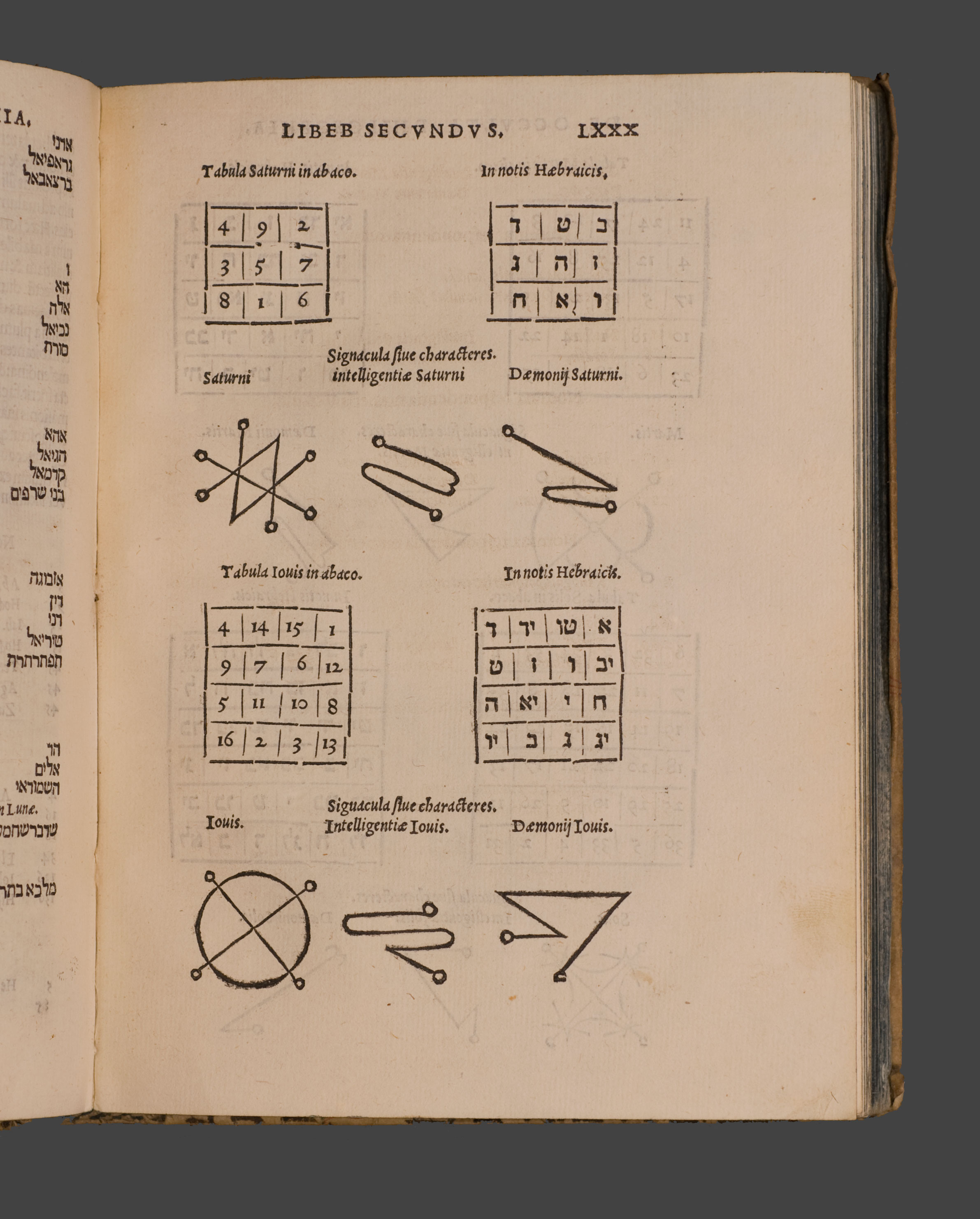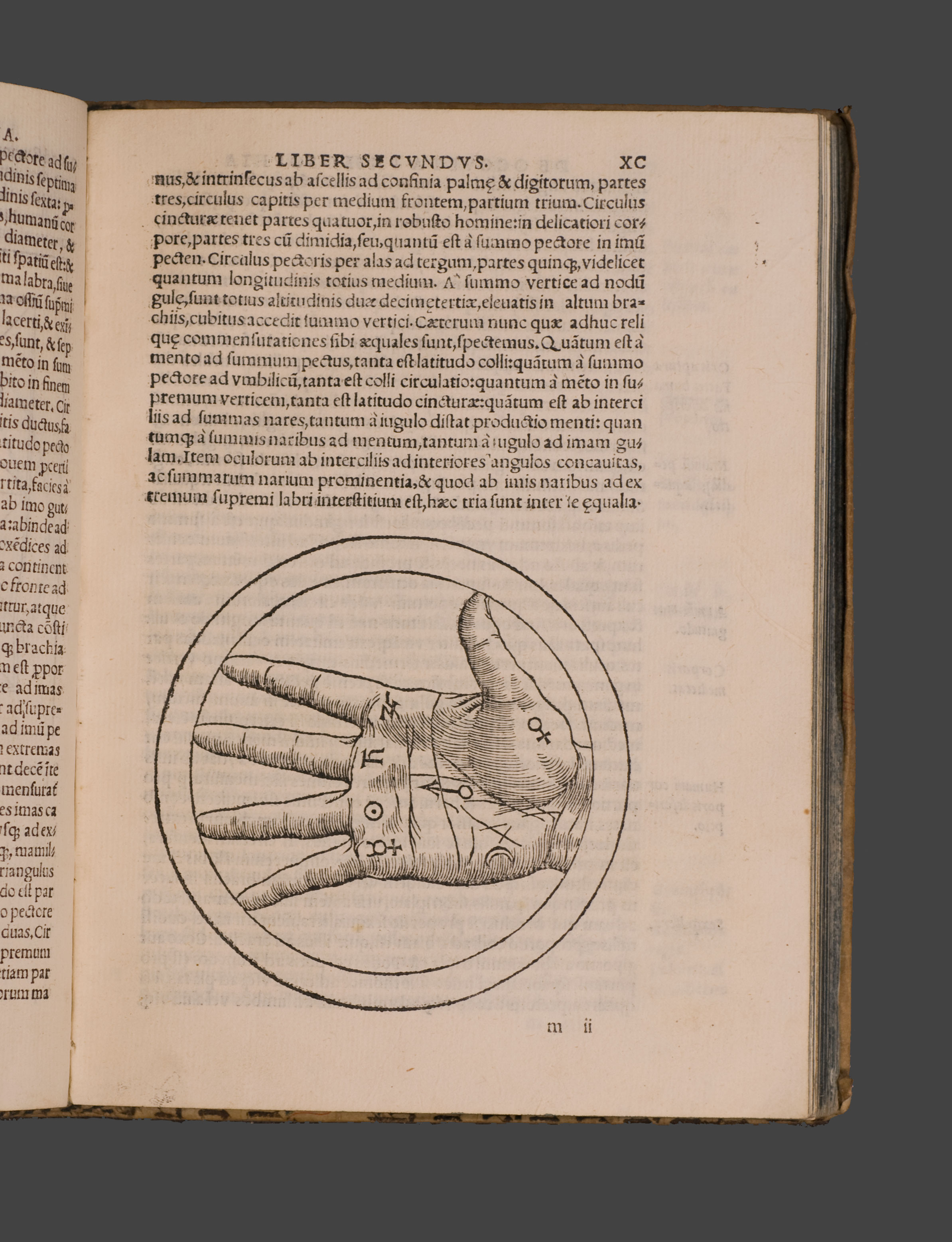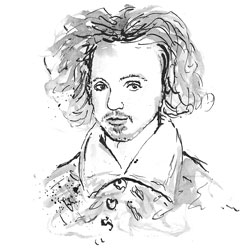Marlowe: Doctor Faustus and Magic
In this essay undergraduate Stephanie Bain looks at the tradition of occult magic in Marlowe's time. Dr Faustus has things in common with high-minded philosophy aiming to extend the potential of human beings, but it also has things in common with forms of witchcraft that were feared and condemned in the period. In the end, Stephanie wonders whether Marlowe may be making a rather sharp point about how people who thought they knew about magic and witchcraft probably knew very little indeed.
A Storm At Sea
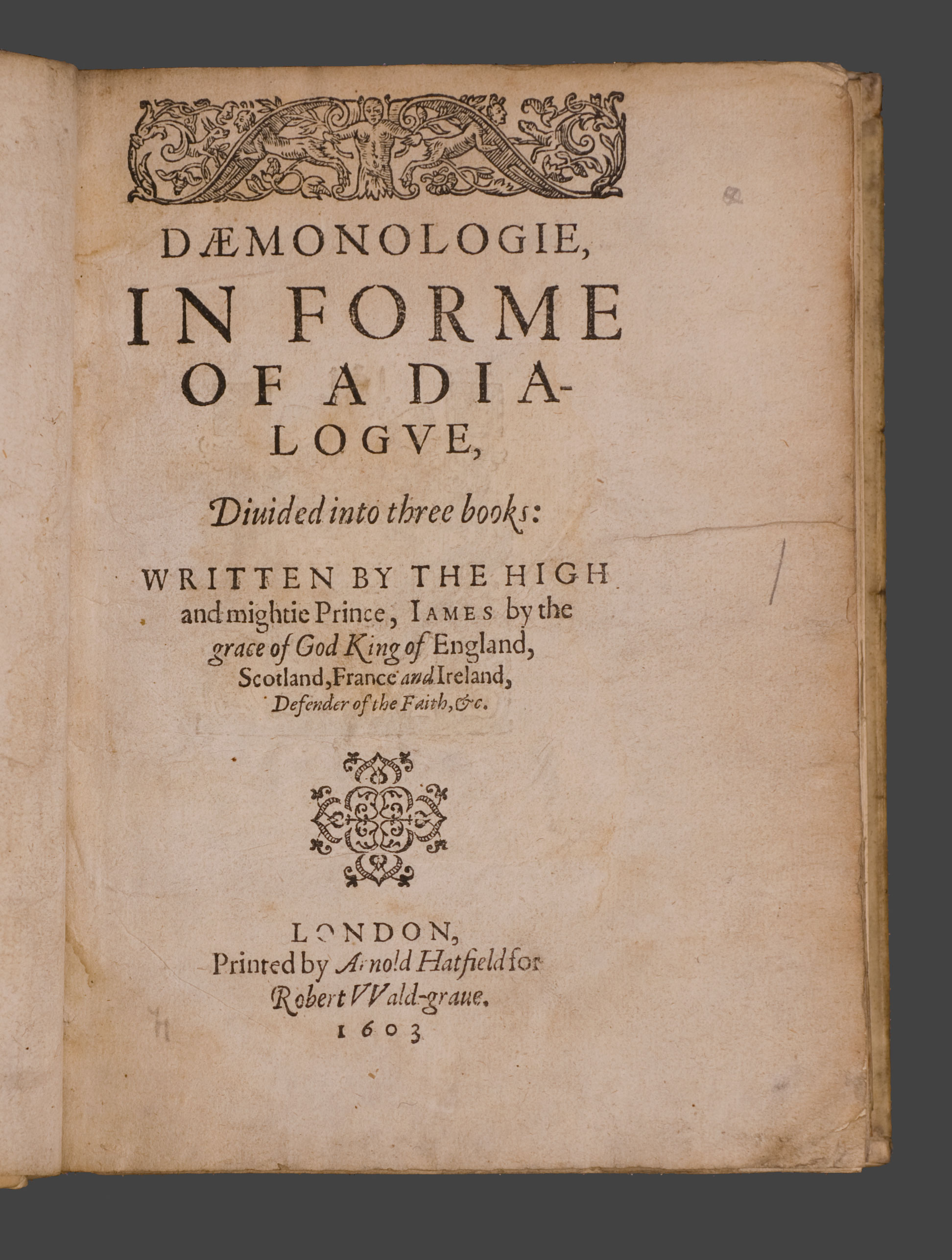
The title page from James VI and I, Daemonologie (London, 1603). The work was first printed in Edinburgh six years earlier.
In 1590 King James VI of Scotland (later James I of England) was travelling home from a winter in Denmark when he was caught in a violent sea storm. By the time he eventually reached the shore of Scotland, he had apparently become paranoid about his own mortality and convinced of a supernatural plot against him. A number of Scots were interrogated and subsequently found guilty of treason for melting a wax effigy to raise the storm. Three hundred 'witches' were accused of plotting to kill James. James' interest in witchcraft was sparked by private fears and suspicions, but in publishing a tract called Daemonologie in 1597 he attempted to harness these personal demons in the name of contemporary scholarship. He can be credited with making and raising of spirits a hot topic at the end of the sixteenth century, when the theatres became filled with ghosts, witches, and devils. Marlowe's Doctor Faustus was first performed in 1594, followed by William Shakespeare's Macbeth (c. 1605) and Thomas Middleton's The Witch (c. 1613). Ben Jonson's early for the Stuart court, The Masque of Queens (1609), featured a dance of witches who appear with snakes and rats on their heads. Putting evil spirits on stage ensured commercial success, and this theatrical popularity also increased interest in a very different concept of Renaissance magic.
Occult Philosophy
The fantastic visions of witches and demons imagined by James VI and others were not the only kind of magic on offer. Renaissance occult philosophy was an established branch of intellectual thought, which drew together with .
The occult philosophers believed that through rigorous study man could realise his full potential and unite with the mind of God. He could then practice what was known as theurgic magic. Theurgic magic was basically seen as 'good' or 'white' magic, involving communion with the divine and the conjuring of angelic spirits to produce wonderful effects. In Doctor Faustus, Marlowe's protagonist has been particularly associated with one of the leading occult philosophers, Cornelius Agrippa. In Act 1 of Doctor Faustus the similarities between Faustus' desires and ideas presented in Agrippa's De occulta philosophia (On occult philosophy), can help us to see the philosophical basis of Faustus' conjuring.
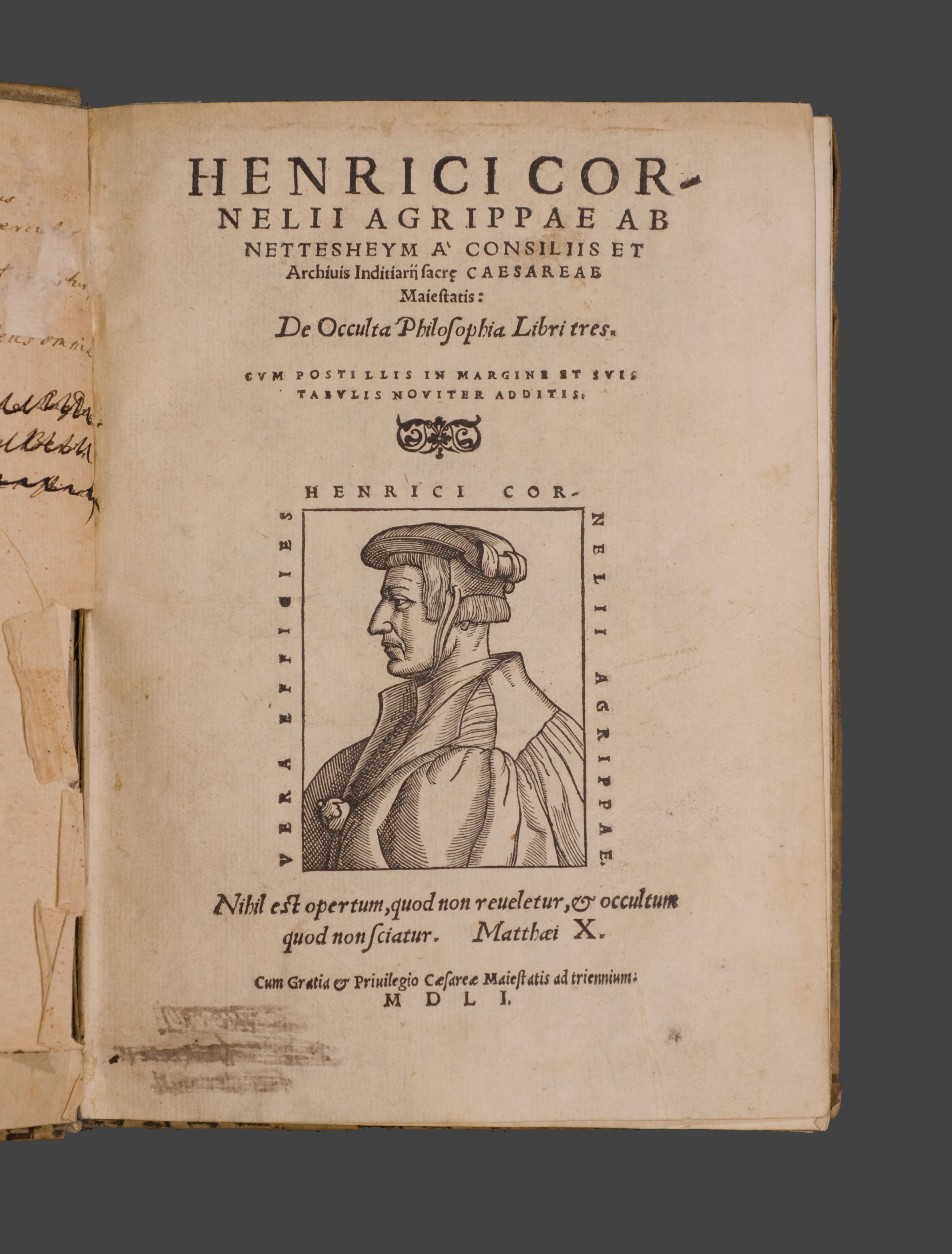
The title page of Heinrich Cornelius Agrippa of Nettesheim, De occulta philosophia libri tres (1551).
In De occulta, Agrippa sets out strict guidelines for the type of man suited to occult investigations: he must have a good grasp of philosophy, mathematics and theology. Faustus shows himself to be qualified in his first speech. He shows an awareness of Aristotle (philosophy), Galen (medicine), Justinian (law) and Scripture (theology) and at the end of the speech he wants to move beyond this learning:
All things that move between the quiet poles
Shall be at my command: emperors and kings
Are but obeyed in their several provinces
Nor can they raise the wind, or rend the clouds;
But his dominion that does excel in this
Stretcheth as far as doth the mind of man: (Act 1, Scene 1, 56-61)
When researching this topic I was struck with the similarity between these lines and the catalogue of feats attributed to occult philosophers in De occulta. Agrippa and his followers believed that an experienced practitioner of magic could conjure spirits to command the elements. The last line shows Faustus thinking of magic, like Agrippa, as a way for man to explore the utmost limits of his potential.
However, the occult philosophers gave a strict warning against conjuring without adequate learning or correct motivation. This is particularly important in the play, as Faustus is such an ambiguous figure. His interest in the occult is encouraged by Valdes and Cornelius, who represent ideal occult philosophers (one of whom shares Agrippa's first name), but Faustus misunderstands the basic tenet of Renaissance magic: the goal of communion with the divine.
Philosophy is odious and obscure,
Both law and physic are for petty wits;
Divinity is basest of the three,
Unpleasant, harsh, contemptible and vile.
'Tis magic, magic that hath ravished me. (Act 1, Scene 1, 106-110)
His rejection of Divinity shows that the 'magic' that has 'ravished' Faustus is not the intellectual philosophy of the Neoplatonists, but a different notion of bad or black magic - the type that terrified James VI. Here the play seems to veer off almost into a different genre. Devils appear on stage and the play becomes a comic , close to the rat-wearing witches of Jonson's Masque of Queens. The arrival of Mephastophilis is followed by Faustus' transformation into prankster and conman, a shift typical of sensationalist supernatural drama of the period. Witchcraft, although initially frightening, is revealed to be merely ridiculous and no more threatening than petty crime.
Different Kinds of 'Spirit'
I noticed that this split, between serious 'philosophy' and comic 'witchcraft', is accompanied by a change in the the language of the play, especially in the use of the word 'spirit'. Neoplatonic philosophers recognised different types of spirit. Angelic or planetary spirits could be conjured and controlled by the skilled philosopher through theurgic ('good') magic. The opposite might happen, however, and an inept practitioner could become controlled by malignant spirits. Faustus, of course, experiences both. The first appearance of the good and evil angels follows Faustus' long speech which ends:
A sound magician is a mighty god,
Here Faustus, try thy brains to gain a deity (Act1, Scene 1, 62-63)
The first line suggests Faustus' misunderstanding of magic and a desire to surpass God, yet the second line could refer to the use of occult philosophy to unite with the mind of God. This ambiguity is dramatized in the dialogue of the two angels. The first dialogue between the angels ends in Faustus' exclaiming:
Shall I make spirits fetch me what I please
Resolve me of all ambiguities,
Perform what desperate enterprise I will? (Act 1, Scene 1, 79-81)
As we have seen, the ability to command spirits was among the abilities of the good occult philosopher and at this point Faustus appears also to have an goal to his desires: he wishes to resolve all ambiguities and understand all that is possible to know. The scene ends with his intention to 'canvas every quiddity' (165). Many of Faustus' other desires, however, resemble the kind of fantastic plans found in witch trials from the 1590s onwards, like flying to India or drying up the sea.
The second time Faustus appears, after the philosophers Valdes and Cornelius have disappeared from the play, Marlowe makes a subtle change from 'spirit' to 'devil', as Faustus prepares to conjure Mephastophilis:
Faustus begin thine incantations
And try if devils will obey thy hest. (Act 1, Scene 3, 5-6)
The good spirits of the occult philosophers are replaced by the devils of the witchcraft texts. From this point 'spirit' and 'devil' are used interchangeably to refer to evil, non-human beings. If you are able to watch a production of Dr Faustus you will notice that as the play continues the stage becomes increasingly populated by these 'devils'. Faustus himself becomes a spirit, Alexander, his paramour and Helen are all spirits. It is with Helen that the two concepts of magic are recombined. Faustus prepare to embrace his fantasy woman with the famous line:
Sweet Helen, make me immortal with a kiss ,
Her lips sucks forth my soul, see where it flies! (Act 5, Scene 12, 83-84)
By presenting Helen as a communing with Faustus, Marlowe stages one of the most horrifying features that appeared in witchcraft confessions: sexual intercourse with demons. Critics such as Walter Greg have suggested that it is this that marks the moment of complete damnation for Faustus. However, I find it very intriguing that at this moment, Marlowe's language reaches back to occult philosophy. 'Make me immortal with a kiss' is unusual because the Cabbalists described the mystical union of human soul with God as 'the death of the kiss'.
So Is The Play Confused?
I've presented the play as veering from a personal tragedy of ambition and misunderstanding, to a comic burlesque on a fashionable theme and then back to philosophical tragedy again. I've suggested that Marlowe combines two completely opposite concepts of magic. This all sounds a bit muddled, but is it possible that Marlowe is doing something quite subversive? James VI intended his Daemonologie to be a serious contribution to occult philosophy. Similarly Faustus can be seen not as a qualified occult philosopher but as a bumbling amateur. He is a man driven by his intellectual aspirations, but without the required rigorous application he falls subject to his own fantasies. The finger is pointed, not at Cornelius Agrippa and his followers, but at the soon to be king of England. Dr Faustus, like Macbeth, shares the excitement embodied in James' demonology obsession, but it represents much more than Marlowe pandering to that interest. Instead, the power is placed in the playwright's pen.
Further Reading
- Henry Cornelius Agrippa, De occulta philosophia libri tres (Three Books of Occult Philosophy), trans James Freake, ed. Donald Tyson (St. Paul, Minnesota: Llewellyn, 1993). This is huge and quite a lot of it sounds like nonsense today, but it is useful to dip into this primary source to get an understanding of the ambition and aims of the occult philosophers. Book 3 Part 4 is most relevant to Dr Faustus, particularly 'Of Natural Magick' and 'Of Theurgrie'. There are a number of readable versions online.
- W. W. Greg, 'The Damnation of Faustus', Modern Language Review, 41 (1946), 97-107. This is a crucial text in Dr Faustus criticism. Greg considers Helen's demonic kiss to be the key to Faustus' damnation. He explores this idea by paying close attention to Marlowe's language.
- Frances A. Yates, The Occult Philosophy in the Elizabethan Age (London: Routledge, 2001). This fascinating book gives a detailed overview of magic and occultism in Renaissance thought. It gives clear explanations of the way Neoplatonic ideas combined with notions from Christian cabbala and profiles of key figures such as Agrippa and John Dee. Yates also relates her ideas to a number of literary texts of the period, including Dr Faustus.
Further Thinking
Stephanie Bain's mention of 'burlesque' draws attention to the fact that many of the things achieved by Faustus' magic are rather farcical. How do you think the audience is meant to react to these moments (e.g. the humiliation of the Pope)?
At the end of her essay Stephanie suggests that Faustus might be a 'bumbling amateur' rather than a profound philosopher or a devilish monster. What difference does this make to your sense of the play as a tragedy?
